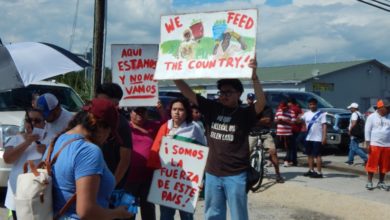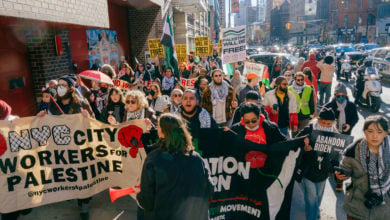The writer is an immigrant rights attorney and PSL candidate for State Representative in Illinois, District 40. To read more about her campaign, click here. To read more about other PSL candidates running in national and local elections, click here.
|
Deportations and the terrorizing of immigrant communities should be seen as actions against all workers by corporate interests. Undocumented immigrants are turned into super-exploited workers who receive lower wages and endure harder, dangerous working conditions that keep costs down for big business.
The U.S. government imposes the free flow of U.S. corporate capital upon its neighbors so it can exploit their labor and natural resources, thus creating the very economic devastation that leads workers to emigrate from their countries.
In this election year, reform of the immigration system is an issue of paramount importance for millions of people. Yet, non-citizen immigrants—more than 29 million undocumented and permanent residents—are denied the right to vote. Consequently, the candidates’ positions on immigration reform are, not surprisingly, quite similar to one another.
Both candidates support immigration reform that penalizes immigrants through fines, lengthy processing times—”going to the back of the line”—and employer sanctions. Their plans allocate billions of dollars to “border security” and enforcement measures that could otherwise be spent on peoples’ needs.
Both candidates fall short
John McCain has a long history of voting for legislation that attacks immigrants. In 1995, he supported HR 2202, which later became the “Illegal Immigration Reform and Immigrant Responsibility Act of 1996,” signed into law by former President Clinton. This legislation overhauled the immigration system, eliminating many avenues for legal status and imposing severe penalties on immigrants for inadvertently registering to vote. Later, when the demand for immigration reform gripped the country, McCain changed his strategy, and Obama mirrored McCain’s positions on immigration reform.
In 2005, John McCain co-sponsored the McCain-Kennedy “Secure America and Orderly Immigration Act,” a bill also sponsored by Barack Obama. This bill would have eased some of the hardships imposed by the current immigration structure, but it would not have eliminated them. It created an employment-based visa—a “guest-worker” program—that required unemployed immigrants to leave the country within two months of losing a job. It also created a work-authorization verification system to increase employer enforcement and enhanced border enforcement measures. That bill was never brought to a vote in the Senate and failed in Congress.
In 2006, McCain co-sponsored the Arlen Specter “Comprehensive Immigration Reform” bill, and Barack Obama championed it. This bill passed in the Senate on May 25, 2006, just 24 days after the massive immigrant rights strike and demonstrations that swept the country. It was modeled after the McCain-Kennedy bill, but it also called for the construction of a border fence, increased the number of border agents, and made those found to be “gang members” deportable. The bill appropriated at least $585 million to border infrastructure alone.
The candidates’ “guest-worker” programs hinge “legalization” on an immigrant’s employment. The pathway for legal residence would be long, arduous, and, in many cases, unfeasible. Applicants would have to pay thousands of dollars in fines and fees, including a state impact assistance fee that would be remitted to states with the “burden” of hosting large immigrant communities.
The visas would have to be renewed until the existing backlog for immigrant and employment visas were cleared. Currently, most of the family-based visas for Mexican immigrants are backlogged to 1992, and visas for Filipino immigrants are backlogged as far back as 1986.
These guest-worker programs create an underclass of cheap, super-exploited labor, often referred to by the ruling class as “low-skill labor.” The programs are designed to meet the needs of the capitalists, not the needs of those struggling to find jobs.
Under programs such as those advocated by McCain and Obama, immigrants would be forced to pay fees to legally work in the United States. They must continually work— having to periodically renew their permits, sometimes over the course of decades—or surrender their status.
Attaching immigration status to an immigrant’s employment blames immigrants for the failings and injustices of capitalism. In an economic downturn such as the present one, when jobs are scarce, immigrants who are unable to remain continuously employed would lose their status and their hopes of legalization, while corporations such as Exxon Mobil continue to reap record profits.
Anti-immigrant programs continue to squander millions of dollars on technology to dam the flow of immigrants, rather than assuring workers access to jobs, health care and education. These programs perpetuate the racist notion that immigrants are to blame for economic recession.
“Comprehensive Immigration Reform,” despite its shortcomings, would have been a victory for the immigrant rights struggle had it passed. Even this business-friendly plan, however, failed in Congress. A revised version of immigration reform failed again in 2007, although both McCain and Obama supported it. The plan included increased enforcement measures and a guest-worker visa that would cost up to $6,000 per renewal for a family of four. Today, approximately 12 million workers remain undocumented, with at least 800,000 undocumented immigrants entering annually.
Barack Obama still embraces guest-worker programs coupled with increased enforcement. He continues to advocate penalties against employers who hire undocumented immigrants, yet his plan would dangle the carrot of “legalization” before immigrant families, making them dependent on the same employers for immigration status. In the end, his plan caters to the same corporate profit interests that support McCain and seeks to drive the price of immigrant labor down as low as possible.
More recently, McCain has swung even further toward his position in the mid-1990s. He supported an English-only bill that declared English the national language. This bill would have eliminated the requirements that legal documents and proceedings be carried out in an immigrant’s language of comfort. It declared that no person had a right to require federal officials to use any language other than English.
McCain recently admitted that he would not vote for the very program that he introduced in the Senate in 2005—the McCain-Kennedy Bill. His website explains that “[i]f we have learned anything from the recent immigration debate, it is that Americans have little trust that their government will honor a pledge to do the things necessary to make the border secure.“
Both Obama and McCain’s plans would mean continued racial profiling, more terror and more destruction for immigrant communities. Both plans reject the amnesty that undocumented immigrant workers demand and deserve, given that the average immigrant family contributes an estimated $80,000 more in taxes than it receives in benefits over their lifetime. Neither candidate condemns the deplorable immigration detention facilities that warehouse a daily average of 33,000 people and where dozens die due to medical neglect.
We need socialism
None of the candidates of the capitalist class is acting in the interests of the working class. They pander immigration policies to racist sentiments that blame immigrants for the economic problems that capitalism creates.
The 2006 and 2007 immigrant rights demonstrations showed the indomitable strength of oppressed workers in their fight for full rights and equality, and both ruling-class parties were forced to respond. Yet, both candidates would now have us believe that they represent “true change” and the interest of the working class. They discourage the very struggle that brought immigration reform to the foreground.
Obama blames political “divisiveness” for “allow[ing] the illegal immigration problem to worsen.” Yet, senior Republicans and Democrats supported the guest-worker and increased enforcement plans. It is the same anti-immigrant racism that would make “guest-workers” dependent on a corporate boss as would allow the exploitation of undocumented workers threatened with deportation.
The success of the immigrant rights movement will not depend on electing one corporate party over another. Struggle of the millions of immigrants in the United States will continue to push forward reform, yet capitalist candidates will do anything in their power to distract us from this reality.
In contrast, the La Riva/Puryear campaign stands with all immigrant workers—documented or not—and demands amnesty and full equality in wages, jobs, voting, union rights, benefits, housing, health care, and education. Disenfranchisement of immigrant workers only benefits the ruling class, splintering the struggle of workers for our common needs. Just as the civil rights struggles of the 60s and 70s won reforms that benefited all workers by militant mass protest, so too will immigrant rights be won in the streets.
The La Riva/Puryear campaign recognizes that inequality and anti-immigrant sentiment are products of an economic system that caters to the wealth of a few. We struggle for immediate reforms that will bring relief to the most oppressed sector of the working class. At the same time, we understand that reforms alone cannot eliminate anti-immigrant sentiment or racism under capitalism.
Wherever human beings and their labor are commodified, pro-worker reforms are always at risk of being reversed. A socialist economy is an economy that caters to the needs of the worker without regard to race, gender, sexual orientation or national origin. Under socialism, a job is a right regardless of national origin.
Full equality for immigrants will not be won through elections but through struggle. The La Riva/Puryear campaign demands full rights for immigrants now, and will continue the fight for a system where people’s needs come first.







